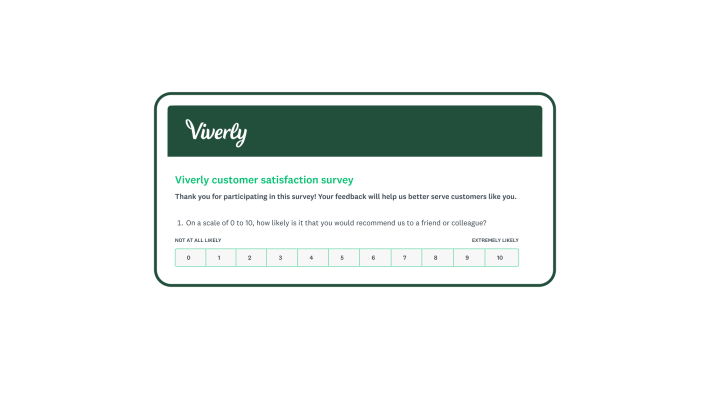Customer service feedback: What it is and how to gather it
Learn effective strategies to gather and act on customer service feedback.

Your customer service team answers the phone, handles emails, and otherwise interacts with your customers day in and day out. They’re a big part of your company's success.
That’s why it’s vital to assess your team’s customer service skills and effectiveness by asking for customer service feedback. Gathering responses to customer service survey questions will help you determine how well your team interacts with customers.
Collecting customer service feedback helps you make better hiring decisions, assess customer service training gaps, and improve your company’s bottom line. But you have to ask the right questions to get the right results.
Let’s explore customer service feedback, why it's important for your business, and the best strategies for collecting it.
What is customer service feedback?

Customer service feedback is any voluntary feedback customers give after interacting with your customer service teams. This feedback could provide insights into how effective they were, opinions about the service, or just general comments they want your company to know.
You can collect customer service feedback through a variety of mediums. For example, you could use social media listening to collect comments or look through any reviews that mention your customer service teams.
Surveys are also one of the most effective and scalable ways of collecting customer service feedback. A survey collects structured, quantitative data that provides insights into how customers feel about a company’s customer service operations.
Related reading: How to provide excellent customer service.
Why is customer service feedback valuable?
In a study from SurveyMonkey, 92% of consumers say customer service is very important when interacting with a company. Your customer service team is on the front lines of customer communication and has a huge impact on customer loyalty and retention.
By collecting feedback about your CX team, you’ll get insights into where they are performing well and where they can improve. With this feedback, you can give your team concrete ways to improve based on quantitative data. You can conduct surveys at regular intervals to track their progress and encourage them to continue to improve.
Here are a few ways to benefit your company by collecting and acting on customer feedback.
Improves the customer experience
One of the most important areas of the customer experience is interactions with customer service representatives. If your service teams aren’t satisfying your customers, then you could be contributing to low satisfaction rates and high customer churn.
Improving how your customer service team operates will directly shape the customer experience you offer to your consumers. Customer feedback will highlight exactly where your teams could improve. By turning customer service feedback into actionable steps your teams can take, they can work on their weak points and further refine their strengths.
The benefit of using a survey to collect customer feedback is that it provides quantitative data, instead of subjective or anecdotal feedback. If a wide sample of customers are having the same experience, that data can be used to drive real change across the customer service organization.
Identifies areas for improvement
While your customer service teams may receive a balance of positive and negative feedback, customers who are dissatisfied with their experiences are more likely to leave a comment. Even if it’s negative feedback, businesses can use these comments to identify customer pain points and develop tangible goals for their customer service teams.
Identifying the areas where your teams can improve will help you create a streamlined and effective customer support channel. Soliciting customer feedback will also help uncover any areas of friction that customers care about. In our study, 61% of consumers said they wanted companies' service efforts to focus only on solving their issue rather than going above and beyond the original request.
Even if your customer service agents are delivering great service, there might be other issues—for example, your service agents may not be able to access details about a customer’s purchase. This data is also important and could help you provide your agents with the resources they need to provide better service and remedy problems.
Boosts customer loyalty
According to SurveyMonkey research, 91% of consumers are likely to recommend a company to a friend or colleague after a positive experience. On the flip side, 81% of consumers are willing to share a poor experience with family and friends. That’s why ensuring your agents are delivering a positive experience is so important—it has a direct impact on referrals, reviews, and recommendations, which today’s consumers are very likely to consider.
Whenever your customers contact support, your team’s ability to rapidly solve their problems might make the difference between a repeat customer and one that chooses a different provider. The more consistently your team can deliver positive experiences, the more likely you will boost customer loyalty, as customers feel like your brand goes that extra mile to satisfy their expectations.
Provides a competitive advantage
While almost every company provides some level of customer service, it’s not always a good experience. Unhelpful automated responses, long wait times, and getting sent to different departments during a service call were the top three consumer frustrations in our recent study.
Effective customer service is a competitive advantage in today’s market. Our study shows that companies that go the extra mile to ensure they connect with customers in a personalized and efficient way will have an edge over their competitors. In fact, research shows that customers are willing to spend 17% more with companies that offer good customer service.
Types of customer service surveys & when to use them
A customer feedback program goes beyond sending out a few surveys—think of it as an ongoing program that collects data on various metrics over time. This data can be tracked and compared so companies have insights into areas where they are improving and where they still need to step up.
Here are the key customer service surveys, what they measure, and when to use each of them.
Related reading: Customer service metrics.
Customer Effort Score (CES)
The Customer Effort Score is a survey that determines the relative effort a customer uses in a certain interaction. It is often conducted as pulse surveys, sent right after a customer service interaction.
Here’s more about Customer Effort Score (CES):
- What it is: The CES is a customer experience survey that helps identify points of friction in the customer experience
- What it asks: The CES asks, “{Company} made it easy for me to handle my issue.” Respondents they choose on a scale from 1-7
- What it measures: The CES measures total friction at any given customer touchpoint.
- When to use CES: Use CES surveys directly after a customer service interaction to measure how effective it was.
- How it’s calculated: To calculate the CES score, take the total sum of responses and divide it by the number of responses
SurveyMonkey research suggests that 82% of customers will back out of payment due to a negative experience. That’s just one example of how friction can have significant consequences for your business. Using a CES to monitor friction in the customer service journey will help you improve the experience and optimize this customer touchpoint.
Net Promoter Score® (NPS®)

The Net Promoter Score is a leading customer experience metric used by companies worldwide to measure loyalty.
Here’s more about Net Promoter Score:
- What it is: The NPS is a customer experience survey that helps companies understand and track customer loyalty
- What it asks: NPS consists of a single question, “How likely are you to recommend our company to a friend or colleague?” which respondents then rank on a scale of 0-10, with 10 being extremely likely and 0 being unlikely to recommend a company
- What it measures: This survey measures customer loyalty
- When to use NPS: Use NPS to quantify customer loyalty and follow up with questions that identify the reasons that customers like, or don’t like, your business
- How it’s calculated: Scores of 9-10 are promoters, 7-8 are passives, and below 6 are detractors. To calculate the NPS score, subtract the percentage of detractors from the percentage of promoters (percent promoters – percent detractors = NPS).
While an NPS survey only has one official question, you can pair it with further questions to clarify why customers respond in a certain way.
Customer service feedback
A customer service feedback survey aims to understand how successful your customer service interactions were.
Here’s more about the customer service feedback survey:
- What it is: This survey determines the quality of customer service experience and identifies any potential problems.
- What it asks: Customer service feedback surveys ask customers questions about their recent service experience, such as “Overall, how would you rate the quality of your customer service experience?”
- What it measures: This customer service survey measures customer satisfaction in relation to your customer service teams.
- When to use customer service feedback surveys: Use these surveys directly after a customer service interaction to get instant feedback from your customer service agents.
A customer service survey will provide comprehensive insights into your teams' effectiveness, what they could do better, and where your customers expect more from your customer support.
Related reading: What to ask in your customer service surveys.
Customer Satisfaction Score (CSAT)
The Customer Satisfaction Score surveys measure overall customer satisfaction with your company’s products and services. You can use CSAT surveys to measure how happy customers are with your company and your customer service teams.
Here’s more about Customer Satisfaction Score:
- What it is: The CSAT survey determines overall satisfaction with your brand or an aspect of your company
- What it asks: It asks customers to rate their satisfaction with a certain product or service on a scale of 1-5 or 1-7
- What it measures: It measures customer satisfaction with whichever product or service you focused the question on. In this case, it would measure customer service satisfaction
- When to use CSAT: Use CSAT surveys to gather insight on how your customers feel about your company and your customer service as a whole. This is a zoomed-out metric that’s useful for benchmarking over time
- How it’s calculated: Measuring customer satisfaction uses the following formula: (Number of satisfied customers (4 and 5) / Number of survey responses) x 100 = % of satisfied customers
CSAT is a useful customer experience metric to benchmark your progress and track how adaptations to your customer service team impact overall satisfaction.
Related reading: 50 examples of great customer satisfaction survey questions.
Examples of customer service feedback in action

Customer service feedback is vital, as 89% of CX pros believe that the customer experience is a leading contributor to churn. A frictionless customer support system is a fundamental building block to delivering a world-class experience to your customers.
Let’s explore examples of customer service feedback in action, looking at circumstances where soliciting and using feedback is effective.
Related reading: The ultimate guide to customer service.
Measuring customer effort & friction
Implement a Customer Effort Score (CES) survey that triggers right after a customer support interaction. As a quick and easy survey, customers will be able to give you insight into how easy to use your service system was.
Understanding CES in relation to customer service will help identify any difficult processes and eliminate friction down the line. Acting upon customer feedback from CES surveys helps refine both how your teams interact with customers and how easy to use your internal support channels are.
After a customer speaks with a support representative
The best time to solicit customer service feedback is right after the interaction happens. You can either send a survey directly to a customer via email or include a question or two in your chat support window.
If you make it easy and natural to give feedback, you’ll have a higher rate of completion, giving you more information to work with. The few moments after a support interaction are when the communication will be freshest in your customer’s mind.
Following an in-person purchase
Businesses can even solicit feedback directly in their brick-and-mortar stores. At a support counter, you can include a device or QR code that allows customers to give feedback to their agents after an interaction.
There are various templates for capturing this feedback at the point of sale or as a follow-up via email or text. Here are some templates to consider for purchase service satisfaction.
Best practices for gathering customer service feedback
Gathering actionable customer service feedback requires high completion rates and a large number of customer responses. Without a large amount of data, it may be hard to turn information into actionable insights that your customer service teams can use to improve.
Here are the best practices for gathering customer service feedback to ensure you have access to as much data as possible.
Keep your survey concise
Surveys should be short, clear, and easy to fill out. Best practices will depend on the nature and timing of our survey. Shorter surveys are often more likely to have higher completion rates. However, it all depends on the goal of your survey and what data you’re trying to collect.
Here are some helpful tips on customer service surveys and best practices for developing surveys that deliver accurate results.
Leverage various feedback channels
When launching a customer feedback initiative, you want to use as many channels as makes sense for your customer base. Offering multiple channels will give your customers more options for leaving feedback, and will likely make it easier for them to respond to your survey.
Different ways of collecting feedback include sending surveys via email, a weblink, and, increasingly, via mobile.
Related reading: How to collect survey responses.
Act on feedback
Asking for customer service feedback is the first step, and listening to that feedback comes next. The final step that makes customer service feedback effective is when you turn it into actionable steps to improve your processes.
For example, if a high number of customer service feedback responses highlight that it took too long to find a solution, then your action might be to provide better training or access to troubleshooting options for your service agents. If wait times are too long, then a better call distribution system or adding more agents might be your solution.
Acting on feedback should provide measurable improvements to your customer service metrics, and create a more positive and impactful customer experience.
Related reading: 3 steps to act on customer experience feedback after you get it.
Close the feedback loop
Don’t forget to close the feedback loop with your customers. Once you’ve collected feedback and put a plan into action to improve the customer service experience, be sure to let your customers know.
Responding to their feedback with a plan or a change to a procedure or policy will show your customers that you care about them and their experience. Where possible, close the feedback loop to build trust and drive the credibility of your company.
Related reading: 5 ways to eliminate bad customer service.
Improve customer service with SurveyMonkey
Collecting customer service feedback is a powerful step towards improving the customer experience and exceeding their expectations. Implementing a plan to address customer feedback will help you create a stronger, more effective customer service team.
Build your own customer experience program with SurveyMonkey. Get started today with an expertly created survey template, or sign up for free to enhance your customer service.
NPS, Net Promoter & Net Promoter Score are registered trademarks of Satmetrix Systems, Inc., Bain & Company and Fred Reichheld.
Discover more resources

Solutions for your role
SurveyMonkey can help you do your job better. Discover how to make a bigger impact with winning strategies, products, experiences, and more.

Why are surveys important in research?
Surveys are important in research because they offer a flexible and dependable method of gathering crucial data. Learn more today.

NPS surveys: Best practices for high response rates
Learn NPS survey best practices to drive high response rates by improving survey processes.

23 ways to increase CSAT response rates
It's hard to improve your customer satisfaction scores without respondents. Get SurveyMonkey's best actionable tips to improve your response rate.